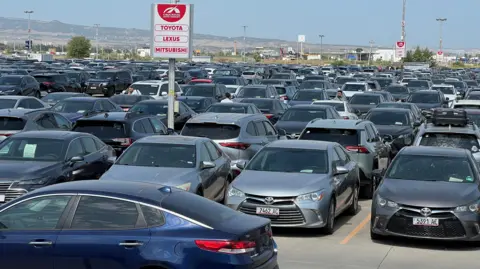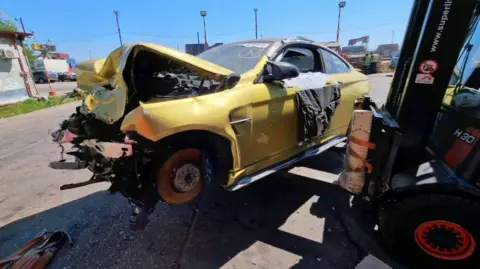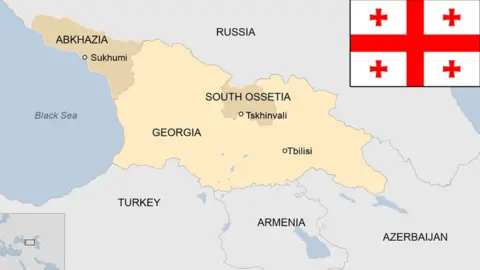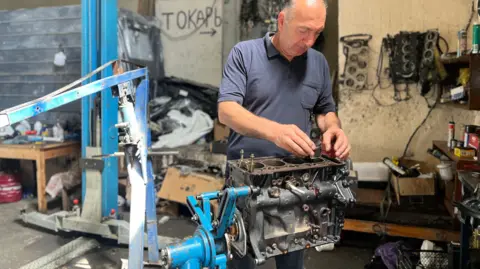 BBC
BBCThe small South Caucasus nation of Georgia has become a multi-billion dollar hub for the international used car market. The vehicles are mostly sourced from the US, and many appear to be ending up in Russia.
On the dusty outskirts of Rustavi, an industrial town 20km (12 miles) southeast of Georgia’s capital Tbilisi, is a vast area of open-air carparks.
Equivalent in size to more than 40 football pitches, it hosts thousands of vehicles up for sale.
You can find pretty much any automobile your heart desires – Mercedes, Porsches, Jaguars, Toyotas and, more recently, Teslas. They are all here.
One of the largest carparks is owned by Caucasus Auto Import (CAI), a company that buys used cars from auctions in the US. The vehicles have often been so badly damaged in accidents that they have been written-off by American insurance firms.
CAI says that its “team of experts” in the States will pick up the cars in person, and then arrange their export by container ship, 10,000km (6,000 miles) to a port on Georgia’s Black Sea coastline. The damaged cars will then be fixed by Georgian mechanics.
“Our company has contributed a lot to the renewal of the Georgian fleet of cars,” says David Gulashvili, CAI’s deputy chief executive. “When we started our business in 2004, Georgian automotive infrastructure was totally Soviet Union produced, like [Soviet brands] Lada and Vaz.”
He says that his company has responded to “a lot of demand for Western-produced vehicles”. Today the firm has 600 employees.

Last year, Georgia imported $3.1bn (£2.4bn) worth of cars, according to official figures. It then exported vehicles to a value of $2.1bn, mainly to former Soviet republics in the Caucasus and Central Asia. Cars are in fact Georgia’s second-largest export by value, after copper ore.
Across the huge car market in Rustavi, curious customers are on the lookout for a deal. Each car has a card on the inside of its windscreen indicating price, engine size, and date of manufacture.
Alisher Tezikbayev has travelled here from Kazakhstan. He and a group of his friends are exploring the Toyota section.
“We’ve been re-exporting cars from Georgia for about 3.5 years. We send cars to Kazakhstan and organise auto tours, when clients come to Georgia to pick their own car,” says Mr Tezikbayev, who is posting videos to his 100k followers on Tik Tok.
Georgia used to export second-hand US and European cars to its northern neighbour Russia, with whom it shares a border. But that has officially stopped as a result of Russia’s invasion of Ukraine in 2022.
In September 2023, the Georgian Revenue Service announced that, in line with the then latest Western sanctions against Russia, it was restricting the re-export and transit of automobiles imported from the US or Europe to Russia and Belarus.
And Georgian officials have long denied that the country has been complicit in aiding Russia’s evasion of the trade embargoes.
Yet a recent investigation by Georgian media publication Ifacti showed numerous loopholes exploited by an army of car dealers on both sides of the Russian-Georgian border.
David Gulashvili says that his company no longer has any trade with Russia. “From day one of the war we have restricted any kind of transactions from Russia, any kind of exports to Russia. You will not see a single car exported by Caucasus Auto Import to Russia.”
However, he adds that there is no existing mechanism to monitor the final destination for re-exported cars going to other countries.
And since Russia’s invasion of Ukraine there has been a steep rise in exports of used cars to Kazakhstan, Kyrgyzstan and Armenia – all of which are members of the Russia-led customs union.
It means that a vehicle registered in any of those countries can be driven to Russia with minimal tariffs.
Figures from Georgia’s national statistics agency suggest that cars are indeed going on to Russia. It says that in 2022 Georgia exported 7,352 used cars to Kazakhstan, while in 2023 the number was 39,896, a more than five-fold increase.

While the geopolitical machinations rumble on, the underling success of Georgia’s second-hand car industry can be explained by its geography. It has access to Europe via its Black Sea ports, and to Central Asia via Baku, on neighbouring Azerbaijan’s Caspian coast.
Another key component is the affordable cost of labour when it comes to fixing salvaged cars.
“These cars that have been damaged in the US, most of the time it does not make economical sense to rebuild them in the US,” says Mr Gulashvili.
“This is because of the cost of human resources, service costs are much higher, and the legal costs to get those cars back on the road, is time consuming and very expensive process.
“In the US rebuilding of a car, and making it legal again, takes six months and let’s say $5,000. It takes $1,000 and one month in Georgia to fix the same car.”
In a sprawling warehouse on the outskirts of Tbilisi, Zaza Andreashvili leans over a car engine fixed to a specialised stand. The mechanic points to the cylinders, which he has just cleaned.
“The engine is the heart of the vehicle. Just like humans, if your heart stop working, you die. The same with the cars, if engine stops working, car dies.”
Mr Andreashvili has been repairing car engines for nearly 30 years. “We used to learn through books, there was no internet at the time,” he says.
Next door to Mr Andreashvili’s workshop, there is a banging noise. Roma and his apprentice Boris specialise in body work repairs.
With a panel-beater, Boris is reshaping the near side wing of a mangled automobile. Roma, in his brown t-shirt with USA written in the front, says he’s been repairing cars for 50 years.
“Mercedes has the best metal, Volvo and Toyotas are also good, but with some cars the body work is so thin it’s like a piece of paper,” he says.

While most cars imported into Georgia are petrol and diesel-powered, Mr Gulashvili says there is a fast-growing demand for electric, and particularly hybrid vehicles.
“About 30% of the cars we are bringing right now, is hybrid. It is not fully electric, but it’s hybrid like Toyota Prius. The growth rate is off the charts, it’s like 300 – 400% rate quarter over quarter.”
The biggest re-sale market for Teslas, adds Mr Gulashvili, is Ukraine, where he has 100 members of staff based.
“It’s very expensive and it’s very risky, but still we’re trying to get traction there. We are also importing a lot of pickup trucks into Ukraine, which are used to fight against Russia.”






